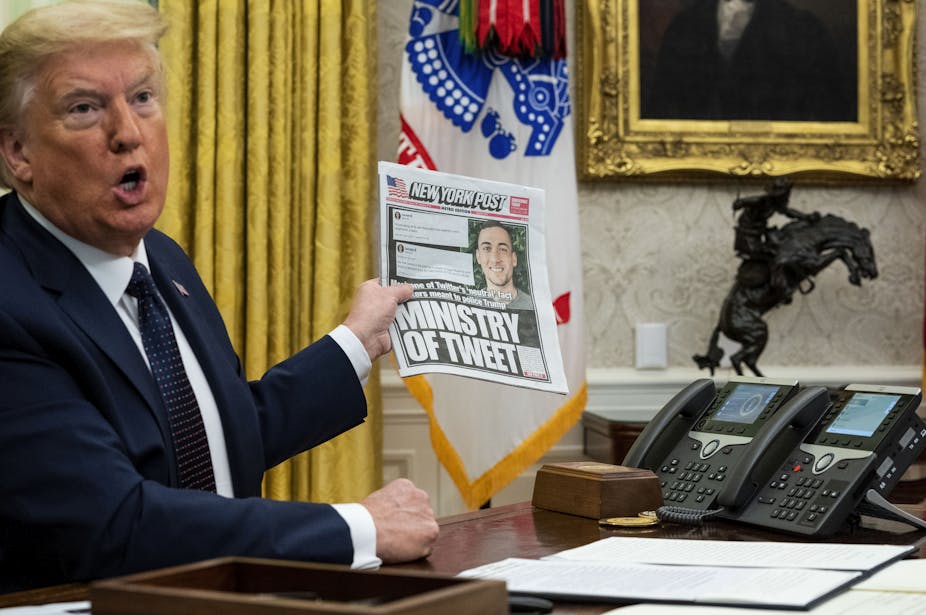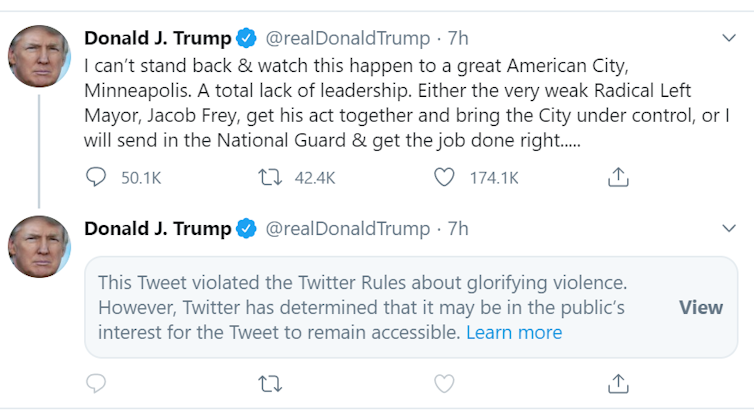from The Conversation
— this post authored by Eliza Bechtold, Durham University
Given that US president Donald Trump appears to use Twitter almost instinctively, his recent attacks on the platform may seem counterintuitive.

Please share this article – Go to very top of page, right hand side, for social media buttons.
But his feud with Twitter is another example of the ways in which the president has routinely distorted the principles of the First Amendment in order to undermine the very freedoms he claims to be championing – as well as American democracy more broadly.
On May 26, Trump tweeted that – contrary to all available evidence – mail-in voting is plagued by rampant voter fraud. Twitter placed a factcheck label on the tweet linking to information demonstrating the falsity of Trump’s claims.
In response, Trump attacked Twitter, accusing it of stifling “free speech” and threatened to take measures to strongly regulate social medial platforms or to potentially close them down entirely.
On May 28, Trump signed an executive order purportedly directed at preventing online censorship, which proposes sweeping changes to protections afforded to social media platforms under US law.
These abuses must be recognised and challenged. Trump is making a concerted effort to disseminate false information regarding the integrity of America’s electoral process with the goal of eroding the public’s confidence in election results and making it more difficult for Americans to vote in the 2020 election. It is a direct attack on American democracy.

US president, Donald Trump, is taking on social media under the guise of protecting free speech. EPA-EFE/Doug Mills/ Pool
The First Amendment’s protections, commonly referred to as “free speech” rights, do not apply to restrictions on speech imposed by non-government actors. As a result, the president cannot legitimately claim that social media platforms are violating his – or anyone else’s – free speech rights. Put simply, there is no First Amendment right to use social media.
Moreover, the Supreme Court expressly recognises that corporations and other private entities have their own free speech rights, and that the First Amendment prohibits the government from interfering in the editorial judgements of private speakers – including business entities – on issues of public concern. In other words, the government may not tell a private speaker what to include or not include in speech about such issues.
So when the president endeavours to interfere with the content of social media platforms via government regulation, he is endangering free speech, not protecting it.
Changing the rules
The main target of the order is the Communications Decency Act (CDA), which established a comprehensive immunity for digital intermediaries for civil liability resulting from the content of third-party users. This means, for example, that Twitter may not be held liable for defamatory comments made on its platform by third parties.
If the CDA was repealed by Congress, this would mean that intermediaries such as social media sites would be treated as traditional publishers like newspapers, magazines and television stations. All of these entities can be held liable for publishing or distributing obscene or defamatory material written or prepared by others and all are free to publish criticism of the president and factcheck his claims.
There is no obligation under the First Amendment for publishers to be neutral on matters of public concern. Indeed, this would be antithetical to US free speech principles. Additionally, the Supreme Court has made it clear that the government has no right to interfere with the “open marketplace” of ideas and no interest in “equalizing” the relative ability of individuals and groups to influence the outcome of elections.
The American Civil Liberties Union warns that the order represents a direct threat to platforms that they will be punished if they engage in speech that displeases the president, and correctly points out that the president “has it backwards: the First Amendment protects us from the government, not the government from us”.
The director of the Program on Platform Regulation at Stanford’s Cyber Policy Center, Daphne Keller, describes the order as “95% political theatre – rhetoric without legal foundation, and without legal impact“. The order should be called out for what it is – a blatant attempt by the president to bully and intimidate platforms in an effort to improperly manipulate public discourse.
It appears that, for the moment, Twitter is refusing to be bullied by the president. On May 29, Twitter hid one of Trump’s tweets regarding unrest in Minneapolis following the killing of George Floyd.
In line with the company’s rules, administrators attached a warning that the tweet “glorifies violence“.
How Donald Trump’s tweet appears on his Twitter feed. Twitter
How Donald Trump’s tweet appears on his Twitter feed. Twitter
Anyone wishing to view the tweet can do so, but only after clicking through the warning.
Free speech? Or authoritarian rule
Trump’s attacks on social media platforms and the press reveal his true intention – which is not to protect the free speech rights of Americans. Instead his strategy appears to be aimed at stifling any and all expression that endeavours to hold him and his administration to account. His use of social media to attack the press as “evil” and the “enemy of the people” – and to malign anyone who criticises him – are blatant attempts to insulate himself from any form of accountability.
.
Such behaviour is anti-democratic and undermines fundamental First Amendment principles, including that the press serves as an important restraint on government and that public discourse must remain free and open to prevent the government from controlling the search for “political truth”.
Trump wants free rein to lie to the American people regarding vital matters of public concern without any restraints whatsoever, including factchecking. In so doing, he is effectively behaving like an authoritarian, attempting to control and manipulate public discourse without criticism or accountability.
The president’s efforts to undermine free speech and to misinform the American public represent a serious threat to American democracy that should not be lost in the cacophony of contemporary political discourse in the US. While alarm bells are ringing, we should all be concerned that with so much noise, not enough people will hear them.
Eliza Bechtold, PhD Candidate in Law, Durham University
This article is republished from The Conversation under a Creative Commons license. Read the original article.











